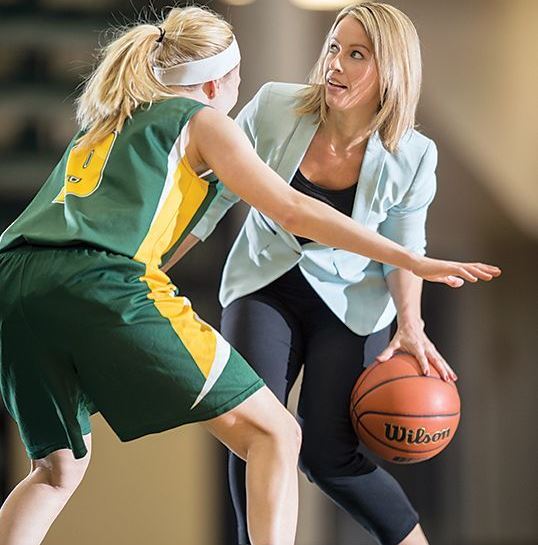
Photo by John Ulan
You started your career in business. What made you switch to broadcasting?
When I was in high school, I had always thought about sports broadcasting, but at the time it seemed like such a crazy thing to try. There weren't a lot of women in it. Then one day I was in Calgary at a work conference and I was sitting in the lobby - unhappy to be at the conference - and I was watching a sports channel. There was a female anchor on, and I thought, "Why don't I try that? If she's doing it, why can't I?"
Was this how you had imagined it would be?
I never imagined I would be on a national channel with millions of people watching me. My goal at the time was to find a job in Edmonton and cover the teams I used to watch growing up: the Oilers and Eskimos and Bears and Pandas. Then I bumped into the vice-president of TSN at the Grey Cup when it was in Edmonton in 2011, and he was looking for somebody to fill a maternity leave. I auditioned and here I am.
What has been the secret to your early success?
Hard work. It's not as glamorous as everybody thinks. Being away from your family and moving six times in three years is not easy. The hours of the shifts that I've worked are not easy. I can think of countless times I would be driving home, by myself, in -40-degree weather on a little Saskatchewan highway, trying to get back to the station to put my show together, carrying all my own equipment and editing all my own stories and getting paid nothing, basically. [But] in the end it showed news directors that I was really serious.
Tell me about those locker-room interviews. What's it like being a woman in what is traditionally a man's domain?
You're never sure how the players or coaches are going to react to having a female in their locker room, but it's so much more common now than it used to be. Female or male, you get a little bit star-struck the first time you walk into a locker room to talk to NHL players, but you get over it quickly - otherwise you'll get beat. You've got to get your interviews and get out.
What do you like most about your job?
The fact that I get paid to watch hockey games. For sports fans, this is a dream job. For example, recently I was out covering the [Los Angeles] Lakers, and I was interviewing Steve Nash and Kobe Bryant. It doesn't feel like work.
You don't get star-struck interviewing Kobe Bryant?
Absolutely, but you get a couple of seconds to be star-struck and that's it. There are probably 25 media people huddling around his stall waiting for him for 25 minutes because he likes to take a long time in the showers. When he finally comes out, people start throwing questions at him. You've got to pay attention and get your question in, because that's it.
What have you learned about an on-camera career?
When you're on live TV, nothing is ever going to be perfect. You're under heavy time constraints. When it's 11 o'clock, you're on, and if you're not ready, you've got to figure out how to sell it anyway.
Any on-air goofs that still make you cringe?
I've called reporters by the wrong name. But the worst one was in Edmonton at an Oilers game. I was doing a live hit, and I dropped my script on the floor.
How do you deal with criticism?
They always say in broadcasting school that you have to have a thick skin because people love to complain: I hate the shirt you're wearing, or what's wrong with your hair? You can't let it get to you or you'll go crazy.
Do you think audiences are more critical because you're a woman?
There's more pressure on women to be perfect. If a male anchor mixes up the names of two athletes, people will say he made a mistake. If a woman makes that same mistake, it's, "Oh, well, she clearly doesn't know what she's talking about."
Natasha Staniszewski answers more questions online
We at New Trail welcome your comments. Robust debate and criticism are encouraged, provided it is respectful. We reserve the right to reject comments, images or links that attack ethnicity, nationality, religion, gender or sexual orientation; that include offensive language, threats, spam; are fraudulent or defamatory; infringe on copyright or trademarks; and that just generally aren’t very nice. Discussion is monitored and violation of these guidelines will result in comments being disabled.